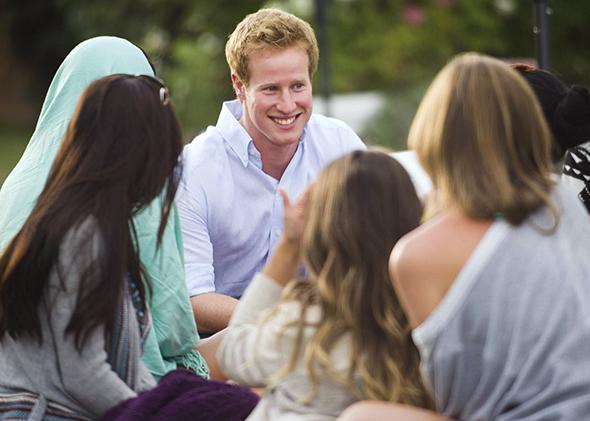I Wanna Marry “Harry,” which starts tonight on Fox, is the most brazenly morally bankrupt reality show to air on network television since the lawless years of the early aughts. Back when the wildly successful first seasons of Survivor set off a bonanza for the format, producers pretty freely explored just how distasteful a show could be before it became too distasteful. It was a muck-burrowing period that sludged upon us Who Wants to Marry a Multi-Millionaire?, Temptation Island, My Big Fat Obnoxious Fiance, Joe Millionaire—of which I Wanna Marry “Harry” is just an update with a fauxyal—and ended with The Swan, a plastic surgery makeover show that still retains the dubious distinction of being the vilest reality show ever to exist. But that was more than a decade ago! And so here comes Harry, a show predicated on the uncomfortable, but not entirely insupportable, supposition that audiences totally will watch something icky, sordid, and morally wanting, so long as a minimal effort is made to make it look like a love story.
A British man named Matt Hicks, who kind of resembles Prince Harry, impersonates him for 12 American women who think they are on a dating show. This is so obviously mean-spirited and disingenuous, the show’s only recourse is to pretend that it is not. To do this, the show presents Matt as just in it for love. Matt is a “poor” guy (please ignore his upper-class accent) who cleans up oil spills and is never given the time of day by the women he deserves. “Can love survive when fame, wealth, and status melt away?” the show asks, framing the story as one in which it is Matt, and not the women, who’s taking the big risk. He’s opening up his heart even though it is possible he will be rejected—not for being a liar and a manipulator, but just for his blameless status as a non-prince. What non-prince among us cannot relate?
For all of this to work, the women have to mistake a snake in the grass for a member of the royal family. And this is Harry’s insidious pièce de résistance, its plausible deniability: The show never tells the girls that Matt is Prince Harry. They trick him out with a castle and a butler (who is also the host), they fly him in with security and a helicopter, they school him in Harry-facts and proper table manners, but they never say his name—they let rumor and speculation and competition do the work. The first time the women see him, it is from afar. The second time they see him, it is at a masquerade ball. By the time he takes off his mask, everyone is drunk. Through the first episode, some of the girls think he’s Harry, some of them don’t, but the doubters are not going to take a chance that they are wrong: Better to humiliate yourself than miss out on an opportunity to be Kate Middleton’s sister-in-law.
Competitiveness as much as gullibility drives the women, and the show makes much of both of these unflattering characteristics. For Matt to be the good guy—the poor, unappreciated diamond in the rough—the women can’t inspire much of our sympathy, or we will recognize him and the show for what they are: lying, lying liars. And so the women get the “bad edit.” They are portrayed as loud and hyper and thoroughly, absurdly American, astonishing this proper Brit with their tawdry sexual aggressiveness and poorly calibrated indoor voices. They are catty and judgmental, and for each one who gets moon-eyed about true love, another talks about how hot and sexy and bitchy and acquisitive she is. (The most down-to-earth girl, a bartender who responds to the situation with anxiety, gets bounced very quickly. This likely saves the show: With her gone, the audience has no one to feel bad for anymore.)
I am loath to call anything about this series clever, but there is something nastily sharp about its savvy manipulation of reality TV clichés. How distinct is this from a show like The Bachelor, really? The bachelor does not flat-out lie about his identity (as far as I know), but on that series, as on this one, a group of women compete for a man they think—based on the word of producers they don’t know very well—is a wonderful, handsome, rich catch, looking for love for all the right reasons. Enough seasons of that show have aired for us to know that this particular fairy tale has been highly, highly finessed. So many of that show’s princes have turned out to be toads, including the one who actually was a prince.
It sometimes feels as though I Wanna Marry “Harry” is knowingly, willfully treading reality TV’s ethical seams, the places where the pus is most likely to ooze out, where our surprisingly naïve expectations run into the workaday manipulations of creating a show like this. It is unimaginable that the women do not smell a royal rat, and yet the show proceeds as though they do not. Whose naïveté is the show really exploiting, then: the participants’ or the audience’s? The women who believe they are competing for a royal, or those of us at home who believe these women believe they are competing for a royal? At certain moments I almost expected the cast to turn to the audience and say, “Come on!” And that means for all its polish, I Wanna Marry “Harry” is not as slick and savvy as it needs to be. It comes way too close to breaking the only really hard-and-fast rule of reality TV: Never tip the audience off that the joke’s on them.
